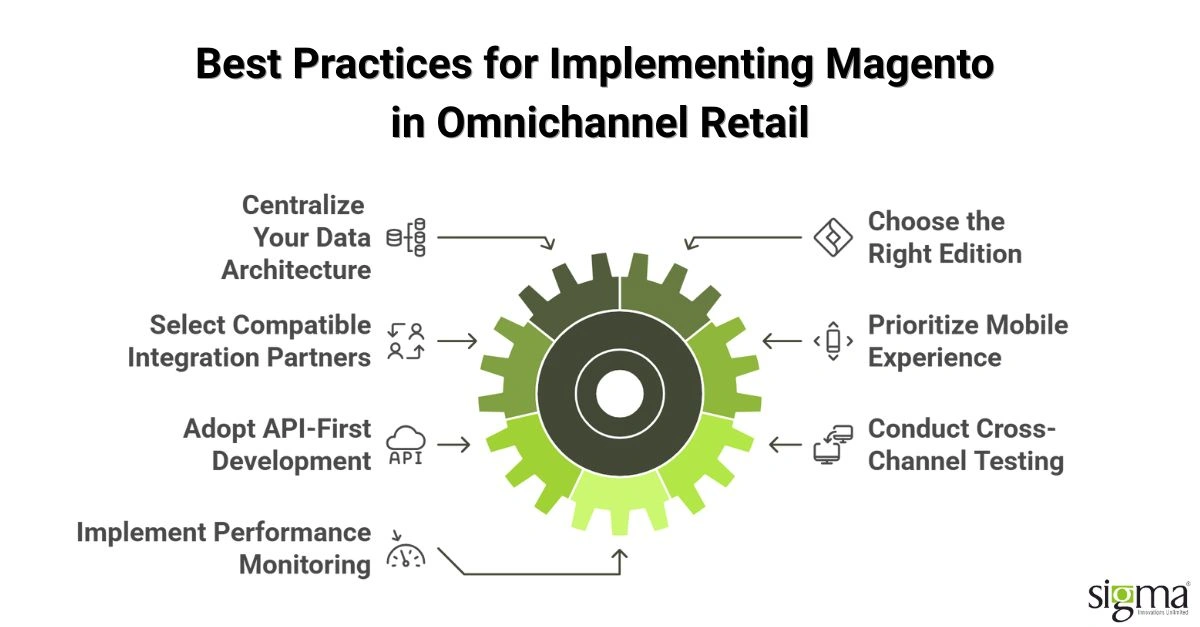Why Magento / Adobe Commerce is the Ideal Platform for Omnichannel Integration

In today’s connected retail landscape, customers expect unified, personalized journeys across mobile apps, websites, marketplaces, and physical stores. Delivering a seamless omnichannel experience is no longer a luxury—it’s a competitive necessity.
To meet this demand, businesses need a backend platform that is flexible, scalable, and built for integration. This is where the Magento omnichannel solution, available in both Magento Open Source and Adobe Commerce editions, truly excels.
What Defines an Effective Omnichannel Experience?
An effective omnichannel experience provides customers with consistent, personalized journeys across all brand touchpoints. Whether shopping via mobile app, website, or physical store, the customer experience remains seamless and interconnected.
Consider this customer journey: A shopper checks product availability online, receives a personalized offer through email, and completes the purchase in-store. They expect their cart contents, loyalty points, and purchase history to be accessible from any channel—this level of integration requires sophisticated backend synchronization.
To achieve this synchronization, businesses need an eCommerce platform that supports centralized data management, unified inventory systems, and consistent user profiles across all channels.
Why Magento Excels at Omnichannel Integration
Centralized Inventory Management
Magento’s Multi-Source Inventory (MSI) feature, available in both editions, enables businesses to manage and synchronize stock levels across multiple locations, including warehouses, retail stores, and fulfilment centres. Key capabilities include:
- Intelligent order routing based on customer location and inventory availability
- Real-time inventory updates to prevent stockouts and overselling
- Support for complex fulfillment scenarios, including ship-from-store and buy-online-pickup-in-store
This functionality is fundamental to any effective Magento omnichannel solution, particularly for businesses managing inventory across multiple locations.
Read the blog to know about Pimcore & Adobe Commerce Integration
Unified Customer Profiles and Personalization
Adobe Commerce with built-in customer segmentation, loyalty program management, and personalization engines. These features enable:
- Consistent customer experiences across digital and physical channels
- Access to order history, loyalty points, and personalized offers regardless of shopping channel
- Advanced customer segmentation for targeted marketing campaigns
This unified approach to customer data is essential for delivering a truly personalized omnichannel experience.
Marketplace and POS Integration
Magento’s modular architecture facilitates seamless integration with third-party POS systems and online marketplaces. Merchants can synchronize:
- Product catalogs and pricing across platforms
- Inventory levels in real-time
- Order management across Amazon, eBay, and in-store systems
- Customer data and purchase history
Advanced Marketing and Merchandising
Adobe Commerce includes sophisticated marketing tools to support omnichannel engagement:
- Dynamic promotional campaigns with cross-channel consistency
- Content scheduling and personalization based on customer behavior
- Integration with leading marketing platforms like Dotdigital, Klaviyo, and Mailchimp
- Unified messaging across email, SMS, social media, and push notifications
Mobile Optimization and Progressive Web Apps
Magento PWA Studio empowers developers to create fast, mobile-first shopping experiences that function like native applications. Features include:
- Offline browsing capabilities
- Push notification support
- Seamless checkout processes
- App-like performance on mobile devices
Given that mobile commerce now dominates global eCommerce traffic, this capability is crucial for delivering an effective omnichannel experience.
Looking for customized Magento eCommerce Solutions? Leverage Sigma Infosolutions’ eCommerce development services for the best outcomes.
Best Practices for Implementing Magento in Omnichannel Retail

Successfully implementing Magento as your omnichannel solution requires strategic planning and careful execution:
- Centralize Your Data Architecture: Ensure inventory, customer profiles, and order data are unified across all channels. Leverage Magento’s MSI and customer management features for real-time synchronization.
- Choose the Right Edition: For businesses requiring advanced personalization, customer segmentation, and loyalty programs, Adobe Commerce provides built-in tools that reduce reliance on third-party extensions.
- Select Compatible Integration Partners: Choose POS and marketplace integrations that support real-time updates and comprehensive order management. Thoroughly test all integrations to prevent data inconsistencies.
- Prioritize Mobile Experience: Utilize Magento PWA Studio to create responsive Progressive Web Apps that deliver consistent experiences across devices.
- Adopt API-First Development: Build with Magento’s REST and GraphQL APIs to ensure seamless integration capabilities and future scalability.
- Conduct Cross-Channel Testing: Regularly audit customer journeys across desktop, mobile, in-store systems, and applications to identify and resolve friction points.
- Implement Performance Monitoring: Use analytics tools to track cross-channel performance, identify bottlenecks, and continuously optimize the customer experience.
Leverage Sigma’s Adobe Commerce (Magento) services and elevate your brand to new heights
Magento vs. Competing Platforms for Omnichannel
Beyond Magento, the e-commerce landscape includes other leading platforms such as Shopify, recognized for its operational efficiency and comprehensive app ecosystem, and WooCommerce, a WordPress-based solution valued for its customization capabilities and cost-effective implementation. The following analysis evaluates how these platforms perform against Magento’s omnichannel capabilities.
| Feature | Adobe Commerce | Magento Open Source | Shopify | WooCommerce |
|---|---|---|---|---|
| Omnichannel Inventory | Advanced multi-source management | MSI support | Limited (third-party apps) | Plugin-dependent |
| Multi-store Support | Enterprise-focused with B2B tools, AI merchandising | Basic capabilities | App-based solutions | Plugin-based |
| API Capabilities | Robust API ecosystem | REST & GraphQL | REST & GraphQL with limitations | Basic REST, custom development required |
| Marketing & Personalization | Built-in segmentation and personalization | Plugin-dependent | App marketplace | Plugin ecosystem |
Conclusion
Magento distinguishes itself as a powerful, flexible platform that enables businesses to deliver truly seamless omnichannel experiences. Whether starting with Magento Open Source or scaling with Adobe Commerce, the platform provides the tools, integrations, and scalability necessary to unify customer journeys across online and offline channels.
With comprehensive inventory management, centralized customer data, extensive third-party integrations, and robust API capabilities, the Magento omnichannel solution positions businesses for sustainable growth in our increasingly connected commerce environment.
Ready to transform your retail operations with Magento’s omnichannel capabilities?
Contact our team to discuss how we can help you create unified, personalized customer experiences that drive business growth.

